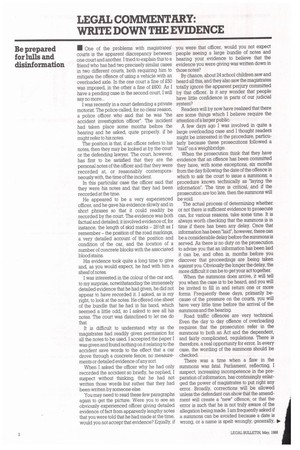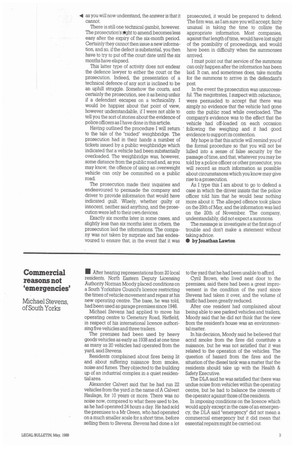Be prepared for lulls and disinformation
Page 4

Page 5

If you've noticed an error in this article please click here to report it so we can fix it.
II One of the problems with magistrates' courts is the apparent discrepancy between one court and another. I tried to explain this to a friend who has had two precisely similar cases in two different courts, both requiring him to mitigate the offence of using a vehicle with an overloaded axle. In the one court a fine of £50 was imposed, in the other a fine of £600. As I have a pending case in the second court, I will say no more...
I was recently in a court defending a private motorist. The police called, for no clear reason, a police officer who said that he was the accident investigation officer". The incident had taken place some months before the hearing and he asked, quite properly, if he might refer to his notes.
The position is that, if an officer refers to his notes, then they may be looked at by the court or the defending lawyer. The court, however, has first to be satisfied that they are the personal notes of the officer and that they were recorded at, or reasonably contemporaneously with, the time of the incident.
In this particular case the officer said that they were his notes and that they had been recorded at the time.
He appeared to be a very experienced officer, and he gave his evidence slowly and in short phrases so that it could readily be recorded by the court. The evidence was both factual and detailed; it involved evidence of, for instance, the length of skid marks 281/2ft as remember the position of the road markings, a very detailed account of the position and condition of the car, and the location of a number of concrete blocks with the associated blood stains.
His evidence took quite a long time to give and, as you would expect, he had with him a sheaf of notes.
I was interested in the colour of the car and, to my surprise, notwithstanding the immensely detailed evidence that he had given, he did not appear to have recorded it. I asked, as is my right, to look at the notes. He offered one sheet of the bundle that he had in his hand, which seemed a little odd, so I asked to see all his notes. The court was disinclined to let roe do that.
It is difficult to understand why as the magistrates had readily given permission for all the notes to be used. I accepted the paper I was given and found nothing on it relating to the accident save words to the effect that a car drove through a concrete fence; no measurements or detailed evidence of any sort.
When I asked the officer why he had only recorded the accident so briefly, he replied, I suspect without thinking, that he had not written those words but rather that they had been written by someone else.
You may need to read these few paragraphs again to get the picture. Were you to see an obviously experienced officer giving detailed evidence of fact from apparently lengthy notes that you were told that he had made at the time, would you not accept that evidence? Equally, if you were that officer, would you not expect people seeing a large bundle of notes and hearing your evidence to believe that the evidence you were giving was written down in those notes?
By chance, about 24 school children saw and heard all this, and they also saw the magistrates totally ignore the apparent penury committed by that officer. Is it any wonder that people have little confidence in parts of our judicial system?
Readers will by now have realised that there are some things which I believe require the attention of a larger public.
A few days ago I was involved in quite a large overloading case and I thought readers might be interested in the procedure, particularly because these prosecutions followed a "raid" on a weighbridge.
When the prosecution think that they have evidence that an offence has been committed they have, with some exceptions, six months from the day following the date of the offence in which to ask the court to issue a summons; a procedure known technically as "laying the information". The time is critical, and if the prosecution are too late, then the summons will be void.
The actual process of determining whether or not there is sufficient evidence to prosecute can, for various reasons, take some time. It is always worth checking that the summons is in time if there has been any delay. Once that information has been "laid", however, there can be a considerable delay before the summons is served. As there is no duty on the prosecution to advise you that an information has been laid it can be, and often is, months before you discover that proceedings are being taken against you. Obviously the longer the delay, the more difficult it can be to get your act together.
When the summons does arrive, it will tell you when the case is to be heard, and you will be invited to fill in and return one or more forms. Frequently these days, primarily because of the pressure on the courts, you will have very little time before the arrival of the summons and the hearing.
Road traffic offences are very technical. Even the day to day offence of overloading requires that the prosecution refer in the summons to both an Act and the dependent, and fairly complicated, regulations. There is therefore, a real opportunity for error. In every case, the wording of the summons should be checked.
There was a time when a flaw in the summons was fatal. Parliament, reflecting, I suspect, increasing incompetence in the preparation of information, has continuingly enlarged the power of magistrates to put right any error. Broadly, corrections will be allowed unless the defendant can show that the amendment will create a "new" offence, or that the error is such that he is not truly aware of the allegation being made. I am frequently asked if a summons can be avoided because a date is wrong, or a name is spelt wrongly; generally, • as you will now understand, the answer is that it cannot.
There is still one technical gambit, however. The prosecutions /light to amend becomes less easy after the expiry of the six-month period. Certainly they cannot then issue a new information, and so, if the defect is substantial, you then have to try to put off the court date until the six months have elapsed.
This latter type of activity does not endear the defence lawyer to either the court or the prosecution. Indeed, the presentation of a technical defence of any sort is inclined to be an uphill struggle, Somehow the courts, and certainly the prosecution, see it as being unfair if a defendant escapes on a technicality. I would be happier about that point of view, however understandable, if I were not able to tell you the sort of stories about the evidence of police officers as I have done in this article.
Having outlined the procedure I will return to the tale of the "raided" weighbridge. The prosecution had in their hands a number of tickets issued by a public weighbridge which indicated that a vehicle had been substantially overloaded. The weighbridge was, however, some distance from the public road and, as you may know, the offence of using an overweight vehicle can only be committed on a public road The prosecution made their inquiries and endeavoured to persuade the company and driver to provide information that would have indicated guilt Wisely, whether guilty or innocent, neither said anything, and the prosecution were left to their own devices.
Exactly six months later in some cases, and slightly less than six months later in others, the prosecution laid the informations. The company was not taken by surprise and has endeavoured to ensure that, in the event that it was prosecuted, it would be prepared to defend. The firm was, as I am sure you will accept, fairly unusual in taking the time to collate the appropriate information. Most companies, against that length of time, would have lost sight of the possibility of proceedings, and would have been in difficulty when the summonses arrived.
I must point out that service of the summons can only happen after the information has been laid. It can, and sometimes does, take months for the summons to arrive in the defendant's post.
In the event the prosecution was unsuccessful. The magistrates, I suspect with reluctance, were persuaded to accept that there was simply no evidence that the vehicle had gone onto the public road while overloaded. The company's evidence was to the effect that the vehicle had off-loaded on each occasion following the weighing and it had good evidence to support its contention.
My hope is that this article will remind you of the formal procedure so that you will not be lulled into a sense of false security by the passage of time, and that, whatever you may be told by a police officer or other prosecutor, you will record as much information as possible about circumstances which you know may give rise to a prosecution As I type this I am about to go to defend a case in which the driver insists that the police officer told him that he would hear nothing more about it The alleged offence took place on the 29th of May, and the information was laid on the 20th of November. The company, understandably, did not expect a summons The message is: investigate at the first sign of trouble and don't make a statement without taking advice.
• by Jonathan Lawton
















































































































